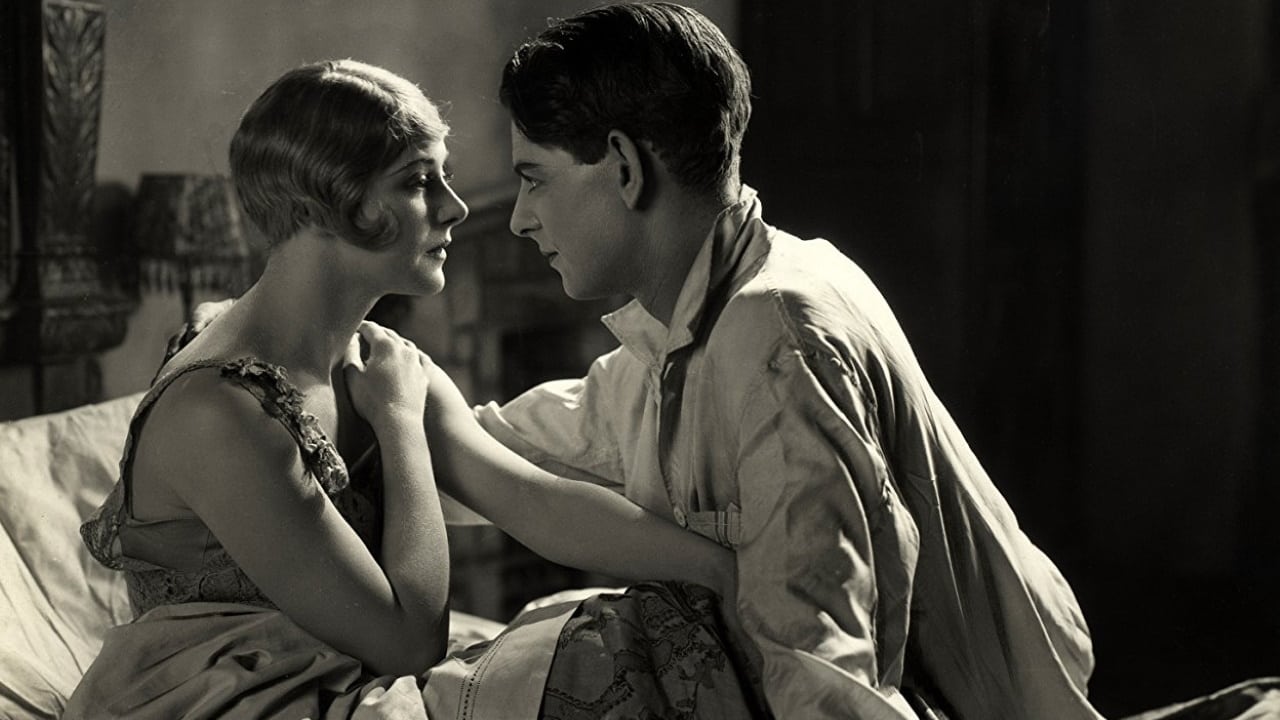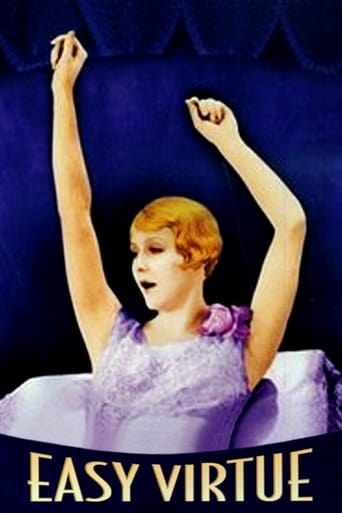

Directed by Alfred Hitchcock, this average silent drama was based on a Noel Coward's play. It's a typical story about a woman, Larita Filton (Isabel Jeans), whose reputation is besmirched per an (implied?) extra-marital liaison. Whether Larita ever had an affair with portrait artist Claude Robson (Eric Bransby Williams) is besides the point; it leads to his suicide and her divorce from Mr. Filton (Franklin Dyall). What follows next is predictable - Larita meets another young man, John Whittaker (Robin Irvine), on holiday, the two fall in love and marry impetuously, shocking his proper family who eventually learns of her secret past. John's proposal and Larita's answer occurs over the telephone, heard by the receptionist (Benita Hume, uncredited) whose expressions tell the audience all they need to know.Ian Hunter (the third and last time he would work with the director) plays Mr. Filton's divorce attorney who, despite the fact that he's a longtime family friend of the Whittakers, is not the source of the disclosure. Violet Farebrother plays John's disappointed mother; Frank Elliott his father. Dacia Deane and Dorothy Boyd plays John's elder and younger sisters, respectively. Enid Stamp-Taylor plays Sarah, the young lady that the Whittakers always thought John would marry; ironically, she serves as Larita's primary support within the Whittaker household.
... View MoreIn Alfred Hitchcock's Easy Virtue, a woman has some explaining to do when the family of her second husband finds out there was a first husband. That's because back in the day, divorced women were considered damaged goods, and upstanding families would steer well clear of such flighty harlots. Easy Virtue's tagline asks "Can she be blamed for a past she didn't create?" And the answer is yes, because she did create her past when she started making eyes at the man painting her portrait. But perhaps I am getting a little ahead of myself.Larita Filton (Isabel Jeans) is married to an unnamed guy. Well, he probably has a name, but the movie doesn't tell us. Anyway, they're rich, and she's having her portrait done by a professional artist. One day the artist notices marks on Larita's wrist, and she mentions that her husband sometimes drinks too much. Thus a relationship is born, at least as far as they went in the 1920s, which meant it's possible Larita and the artist smooched once. Anyway, one fine day the husband comes home to find the two of them in an embrace. A gun is presented, and a shot is fired, and the artist dies. This is all told to us in flashback at the divorce trial, where the jury quite naturally finds in favor of the husband. Larita is shamed and shunned.She finds herself chillaxing on the Mediterranean, and a chance encounter with a tennis ball leads Larita to meet John Whittaker (Robin Irvine), who's from a well-to-do family himself. They romance, yadda yadda, and soon they're wed. He brings her home to meet his parents and his two sisters for dinner. The stern matriarch is fairly sure she recognizes Larita, and eventually she pieces it together. Haughty hilarity ensues.This is a silent film, obviously very early in The Master's career, and much more of a melodrama than a thriller with a twist. There's no twist, and because there are few sight gags one must rely on the intermittent title cards to follow the mouthed dialog. That's all well and good, but there was just too much predictability afoot, and the quality of the print did the movie no favors, either. That all makes Easy Virtue a curio in Hitch's long, long career, and little more.
... View MoreEasy Virtue is one of Alfred Hitchcock's best films. It follows Larita Filton who at first is married to a drunk but starts to fall for a painter. When they get filed for divorce her husband brings her to court for adultery, believing that she was cheating on him with the painter. She eventually goes to France and marries a man named John Whittaker but she also attempts to hide her past from him. But when John's family starts to find out a few things about Larita's past her relationship with her new husband starts to become strained. Does her relationship survive? So basically I find it a very interesting and entertaining plot which keeps the viewer entertained all the way until the end where the film seems to end very abruptly. This makes me wish that the film had a little bit better closure and had gone on for just a little bit longer.All of the actors in the movie do a great job with Isabel Jeans playing Larita with true excellence. She seems to act very naturally instead of the typical exaggerated expressions that you see in most silent films. John's disapproving and unhappy mother is played very well by Violet Farebrother who gets her anger and disapproval across very well. Robin Irvine manages to do a nearly perfect job as John so basically all of the actors are great including minor ones.Each and every one of the sets in this film are great and the only noteworthy special effects shot, a man firing a gun, is done very well for the time. The soundtrack for the film fits it very well even if some of it has already been used in earlier Hitchcock films.This is a movie that really caught me off guard with its high level of quality and entertainment value. The plot is based off of a 1925 play and it ends up working very well here in the movie, the film is a pretty good length although it could have used a little bit more footage at the end, the acting is stupendous, the music is great and fits the movie well, and finally the special effects are great. So this is an excellent film from the silent era and a classic that should be watched and enjoyed by everyone. Score: 9/10
... View MoreThis sophisticated melodrama from a Noel Coward play is clearly unsuited to Hitchcock's particular talents: the initial court-room sequence is the best, allowing the director to experiment with camera technique (especially his creative use of the dissolve to jump from the present into the past and back again); the rest is a succession of clichéd situations, making it a rather tedious whole. The most notable cast member is Ian Hunter, though leading lady Isabel Jeans did go on to play prominent roles in GIGI (1958) and HEAVENS ABOVE! (1963). With this, I've only 3 more extant Hitchcock Silents left to watch - THE PLEASURE GARDEN (1925), DOWNHILL (1927) and CHAMPAGNE (1928); his second film, THE MOUNTAIN EAGLE (1926), is believed lost.
... View More